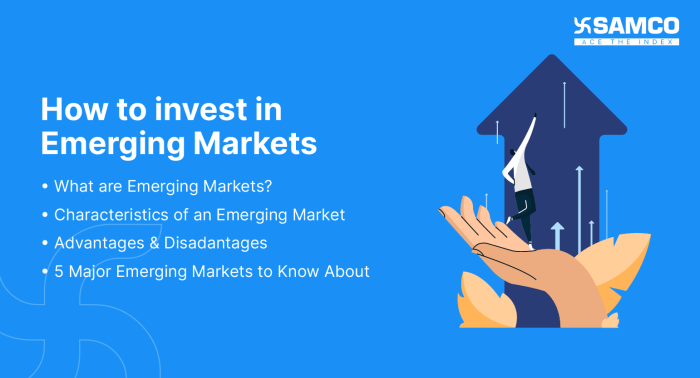How to invest in emerging markets, this introduction immerses readers in a unique and compelling narrative that delves into the intricacies of investing in emerging markets. From understanding the appeal of these markets to exploring different investment vehicles, this guide covers essential aspects to help you make informed decisions.
Understand Emerging Markets
Emerging markets refer to countries that are in the process of rapid industrialization and experiencing significant economic growth. These markets are attractive to investors due to the potential for high returns on investment and diversification opportunities.
Characteristics of Emerging Markets
- High Growth Potential: Emerging markets often have higher growth rates compared to developed markets, offering the potential for substantial returns on investment.
- Volatility: Emerging markets can be more volatile due to factors such as political instability, currency fluctuations, and regulatory changes.
- Less Developed Infrastructure: Infrastructure in emerging markets may be less developed, presenting challenges and opportunities for investment in sectors such as transportation, utilities, and telecommunications.
- Youthful Demographics: Emerging markets typically have younger populations, which can drive consumer spending and economic growth.
Risks and Opportunities in Emerging Markets
- Risks:
- Political Instability: Emerging markets can be prone to political unrest and government instability, which can impact investments.
- Currency Fluctuations: Exchange rate fluctuations can affect the value of investments in emerging markets.
- Lack of Regulation: Some emerging markets may have inadequate regulatory frameworks, increasing the risk of fraud and corruption.
- Opportunities:
- Diversification: Investing in emerging markets can provide diversification benefits by spreading risk across different economies and industries.
- High Growth Potential: Emerging markets offer the potential for high returns on investment due to rapid economic growth and development.
- Access to Untapped Markets: Investing in emerging markets provides access to new and growing consumer markets that may offer significant opportunities for growth.
Research and Analysis: How To Invest In Emerging Markets

Research and analysis are crucial steps when considering investing in emerging markets. By understanding the economic indicators, political stability, and regulatory environment of a country, investors can make informed decisions to mitigate risks and maximize returns.
Methods for Conducting Research
- Utilize financial news sources, government reports, and reputable websites to gather data on the country’s economic performance.
- Consult with local experts or investment professionals who have experience in the specific emerging market you are interested in.
- Review historical data and trends to identify patterns that may impact future investment opportunities.
Analyzing Economic Indicators, Political Stability, and Regulatory Environment
- Look at GDP growth rates, inflation rates, and unemployment figures to gauge the overall health of the economy.
- Assess the political landscape and stability of the country to determine potential risks that could impact investments.
- Examine the regulatory environment to understand the laws and policies that govern foreign investments in the country.
Importance of Diversification and Risk Management
- Diversification is key to reducing risk when investing in emerging markets. Spread your investments across different countries, industries, and asset classes.
- Implement risk management strategies such as setting stop-loss orders, using hedging techniques, and staying informed about geopolitical events that could impact your investments.
- Stay updated on market trends and be prepared to adjust your portfolio based on changing economic conditions and political developments in the emerging markets you are invested in.
Investment Vehicles

When looking to invest in emerging markets, there are several investment vehicles available to consider. These options can provide different levels of risk and return, catering to various investor preferences and strategies.
ETFs, Mutual Funds, and ADRs
Exchange-Traded Funds (ETFs) and Mutual Funds are popular options for investors looking to gain exposure to emerging markets. These funds pool money from multiple investors to invest in a diversified portfolio of securities from emerging market countries. They offer the advantage of diversification, professional management, and ease of access for retail investors.
- ETFs: ETFs are traded on stock exchanges like individual stocks and provide investors with a way to invest in a broad range of emerging market securities. They offer liquidity and transparency, making it easier for investors to buy and sell their positions.
- Mutual Funds: Mutual funds are managed by professional fund managers who make investment decisions on behalf of investors. They offer diversification and convenience, but may come with higher fees compared to ETFs.
- ADRs (American Depositary Receipts): ADRs represent shares of foreign companies that are traded on U.S. stock exchanges. Investing in ADRs allows investors to gain exposure to emerging market companies without the need to directly trade on foreign exchanges.
Direct vs. Indirect Investments
Investors can choose between direct and indirect investments when entering emerging markets. Each approach has its own set of advantages and disadvantages.
- Direct Investments: Direct investments involve buying securities, such as stocks or bonds, of companies or governments in emerging markets. This approach offers the potential for higher returns but also comes with higher risks, as investors are exposed to the specific risks of individual companies or countries.
- Indirect Investments: Indirect investments, such as through ETFs or mutual funds, provide a more diversified exposure to emerging markets. While they offer lower risks compared to direct investments, they may limit the potential for outsized returns that can come from successful individual stock picks.
Role of International Brokers and Platforms
International brokers and platforms play a crucial role in facilitating investments in emerging markets for investors located outside those regions. These brokers provide access to international markets, research tools, and trading platforms, enabling investors to buy and sell securities in emerging market countries.
- Benefits of International Brokers: International brokers offer access to a wide range of investment opportunities, including stocks, bonds, and other securities from emerging markets. They also provide valuable research and analysis to help investors make informed decisions.
- Considerations: When choosing an international broker, investors should consider factors such as fees, regulatory compliance, customer service, and the range of available investment options. Conducting thorough research and due diligence is essential to ensure a smooth investment experience.
Due Diligence and Monitoring
Performing due diligence before making investments in emerging markets is crucial to mitigate risks and make informed decisions. This involves conducting thorough research and analysis to understand the market dynamics, regulatory environment, political stability, and economic conditions of the country or region.
Monitoring investments in emerging markets is equally important to track performance, identify potential risks, and adjust strategies accordingly. This requires staying informed about market trends, geopolitical events, and economic developments that may impact the investment landscape.
Steps for Due Diligence
- Conduct thorough market research to understand the political, economic, and social landscape of the emerging market.
- Assess the regulatory environment and legal framework to ensure compliance with local laws and regulations.
- Evaluate the competitive landscape and market potential to determine the feasibility of the investment.
- Analyze the financial health and performance of the companies or assets in which you plan to invest.
- Consider the currency risk and macroeconomic factors that may impact the investment returns.
Monitoring and Adjustment Strategies, How to invest in emerging markets
- Regularly review the performance of your investments and compare them against the set benchmarks to track progress.
- Stay updated on market trends, economic data, and geopolitical events that may influence the investment climate.
- Adjust your investment strategies based on changing market conditions, risk appetite, and investment goals.
- Diversify your portfolio to spread risk and minimize the impact of market volatility.
- Seek advice from financial experts or investment professionals to gain insights and make informed decisions.
Best Practices for Staying Informed
- Subscribe to reputable financial news outlets and publications that cover emerging markets.
- Attend conferences, seminars, and webinars focused on emerging market investments to gain insights from industry experts.
- Use analytical tools and research reports to keep track of market trends and economic developments.
- Join online forums and communities to engage with other investors and share knowledge and experiences.
- Stay connected with local contacts or partners in the emerging market to get firsthand information and insights.
In conclusion, navigating the world of emerging markets requires diligence and strategic planning. By following the tips and strategies Artikeld in this guide, you can embark on your investment journey with confidence and a better understanding of the opportunities and risks involved.
Obtain access to High-return investment options to private resources that are additional.


